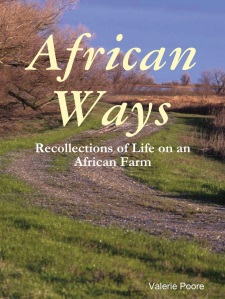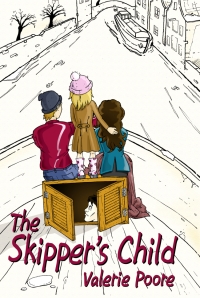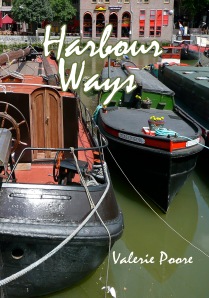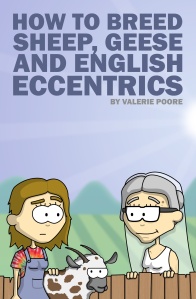Africa, Barges, Canals, Children's books, Children's stories, fiction writing, Insights, Interview, Netherlands, writing
Val Poore. Writing with a sense of adventure
Val Poore leads a life that I find very appealing; on a barge in a country where being on the water is second nature. Indeed the extensive waterways in the Netherlands has provided inspiration for some of Val’s books. The variety of her writing also shows how open she is to new experiences.
Tell me about yourself and how you came to live on a barge in Rotterdam.
The idea first cropped up when I came here from South Africa to join my ex-husband in 1999. I’d never seen anyone living on a boat before – South Africa has very little surface water that is navigable – so I was immediately intrigued. In fact, we bought a barge together as a project, but then things went pear-shaped between us and I went back to South Africa to work at my old company on a contract.
However, a problem arose when I came to the end of that contract in December 2000, and I had nothing to keep me there. I’d been staying with friends in Johannesburg and had no home of my own anymore. I had to make a choice between starting to build a new life on my own in South Africa again, or trying to make it back in Europe. The decision was more or less made for me when a friend, Philip (who features in my book, Watery Ways), offered me the opportunity to rent a barge from him if I wanted to return to Europe and needed a place to stay. I decided to come to the Netherlands again, give it six months and then see how I felt. I arrived on 23 December (I think), 2000 and moved onto Philip’s barge, the Hoop, early in January 2001.
You teach English for business and academic purposes. This is a very formal way of writing, whereas writing fiction requires a different approach. Do you find there’s a conflict when you have to switch from one to the other?
Actually, no, I don’t. I think it’s because I’ve always been very aware of the need to write for a particular audience. I worked for years in marketing and communications, and it was hammered into me there that I had to adapt my writing to suit the reader. Because I was the only person doing both internal and external communications for the company, I did everything from copywriting for advertising and brochures, to formal reports, legal documents and letters to the clients, so I got used to switching styles then. I should say this was really good practice for teaching business English later on.
When I started writing fiction, changing styles again came quite easily as I’ve always been an avid reader and have written stories since childhood. As for academic writing, it’s just another discipline again, so having done some of this type of writing for my own studies, I followed a course in teaching methods for academic English and carried on. These days, I just change hats according to the requirements, but I do thank my years in marketing for the training in adaptability.
Going through the different styles of books you have written, explain the characteristics that makes each genre work and appeal to its readers.
This is a difficult question to answer. In truth, I am writing for different audiences with each book, so it depends on who the readers are as to whether my books appeal to them or not. For instance, African Ways, my memoir about life on a farm in South Africa focuses on what made Africa so special to me. I know this has appealed to many South Africans who can relate to the way I experienced the country, and also to people who would love to go there. On the other hand, my two boating memoirs, Watery Ways (which has just won the award for best memoir in the 2014 E-festival of Words) and Harbour Ways are about a very different way of life, especially for a single woman (as I was then), so my audience has been largely either boating people, or readers who dream of cutting loose from suburban normality and living this kind of alternative existence.
As far as my fiction goes, The Skipper’s Child is ostensibly for young adults, but it seems to have wider appeal as a period adventure/suspense story for all ages; again, it’s about a different way of life, so it probably appeals to readers both young and old as being something a bit unusual, and therefore interesting. In many respects, this is the book I am most proud of and I’m very happy to say it has won the silver award for teenagers’ books in Wishing Shelf Awards, a book prize awarded by readers rather than by critics. That has meant a great deal to me because it is readers beyond my circle of acquaintances, either internet or real life, who have voted for it.
My other novel is completely different again, being a comedy called How to Breed Sheep, Geese and English Eccentrics. It is a light-hearted and tongue-in-cheek book set in the late 1970s about a girl who tries to help her mother save her large and impractical country home by doing the self-sufficiency thing. It is written in the first person, so as such it limits the characterisation, but I have tried to paint the characters vividly in other ways. My Eccentrics have attracted various epithets, but the most frequent ones seem to be ‘charming’, ‘feelgood’ and ‘life affirming’, so as you can deduce, it is not heavy or challenging reading. I wouldn’t go so far as to bracket it as contemporary fiction, but I would hope it sits happily in the ‘humour’ category. I like writing comedy because it allows me to indulge my sense of the absurd as freely as I want; something I often have to control in real life.
Do you find switching genres confusing?
No I don’t, not really. When I started writing seriously, I knew I wanted to try different genres to see what I was capable of doing. I’ve written three memoirs – two in the same style and one different – and two novels in very different genres, so I am ready to try something different again. I’d love to attempt some crime fiction, but I think would need more time than I have right now to work everything out. Maybe when I’ve finished the books I’m currently working on I might give it a try. I love experimenting and seeing what works. This is probably why I’ll never be very successful, though. It seems that the most popular writers are those who write in a specific genre. People get to know them for that and can anticipate that they will like what they buy. With me, there’s no such certainty as I’m always changing tack. I’m my own worst enemy in that respect.
You’ve been published conventionally and you’ve self-published. What have been your experiences with both?
There are advantages and disadvantages to both. Being published is wonderful in many ways as the publishers have professional editors and proofreaders to polish your work. They also provide cover artists and give the author the sense of confidence that everything is going to be professionally produced and of good quality. That said, they naturally have their own requirements and the author loses some control over what happens when and how the book is presented. Self-publishing is very hard work. The editing, proofreading and formatting of a book take months, and even then, things can go wrong. You have to have endless funds of patience and to be very dedicated to produce a book both in print and e-book formats. On top of that, all the marketing is down to the author, although in truth much of it is when you are published as well. The upside of self-publishing is that as a writer, you are in complete control and that is great. Your books are released when you want them to be and you are free to market them where and how you like. You can also keep track of your own sales, which helps in knowing what to promote and how much.
How different are the waterways where you are compared to Britain?
Firstly, the waterways over here in the Netherlands are a completely different ball game from those in the UK. English canals are hardly used for commercial purposes at all with the rare exception of a few coal boats that supply fuel to the residential boat owners. There are some commercial barges on the rivers, but again, not many. English waterways are largely just used for pleasure craft these days. In the Netherlands, however, the commercial traffic still takes precedence over everything and pleasure boats have to take this into account. The waterways are busy highways and we have to be very aware of the regulations. We also have to have a licence (the boat equivalent of a driving licence) to cruise with our barges. It can sometimes be quite intimidating on the rivers and big sea canals too as we have massive sea-going coasters and tankers on them. But the average size of a commercial barge is between eighty and a hundred and ten metres long and between six and ten metres wide. Even they are big! We feel like minnows in our twenty metre historic barges.
If a writer were to take a trip on Dutch waterways, what do you think they would find to inspire their writing?
As a writer myself, I find the waterways here immensely inspiring. They cut their way through Europe from north to south, and pass through nearly all the major European cities too. Just imagine being introduced to Paris by water, or to Vienna or Berlin! I haven’t done it yet myself and have only been as far as Lille in France so far, but travelling through Belgium is a joy. The smaller waterways here are much less busy with pleasure boats than the English canals, and they pass through some stunning countryside. It’s very much like living life in the slow lane, but if someone is interested in the culture of a country, I cannot think of a better way to find out about it. The opportunities for meeting and talking to local people and seeing gems of history and architecture are endless.
What are you working on now?
I am writing about my experiences in Belgium at the moment. It’s another memoir type book but focused more on the country and my experience of the people and places than my Rotterdam memoirs are; they are mainly about life on a barge. I am also starting a new novel, but that is on another subject completely. As you know, I’ve written two novels: one about the waterways, The Skipper’s Child, and the other the tale about smallholding and self-sufficiency in the wilds of Dorset. Incidentally, this was also my first attempt at fiction for adults. The new book will have parallels with my Eccentrics in that it is also set on a farm, but this time in South Africa. I still love the country dearly and wanted to write a novel that would be uplifting and reflective of the gaiety, warmth and spontaneity of these colourful people instead of the rather sombre novels that have come out of the region in recent years.







It was a great pleasure to be featured here and to talk to you, Elaine. Thank you very much!
Thank you for your time Val. You’ve done more so far, than most people do in a lifetime.
All accidental, Elaine 🙂 By the way, I’d like to add here that there are three beautiful books about South Africa I’ve read recently that have taken a refreshing stance on life under apartheid; one is Lynn Moorhouse’s Aunt Coco and the Marionette Man; one is by Earl Moorhouse, The Last Summer in Little England and the third is Frankie and Stanki by Barbara Trapido. So I would recommend these to everyone who is interested in SA’s historical background but would like to read it in literary form. They are all fantastic books!
Thanks for the recommendations Val.